Search, explore and shop the world’s information, powered by AI
AI advancements push the boundaries of what Google products can do. Nowhere is this clearer than at the core of our mission to make information more accessible and useful for everyone.
We've spent more than two decades developing not just a better understanding of information on the web, but a better understanding of the world. Because when we understand information, we can make it more helpful — whether you’re a remote student learning a complex new subject, a caregiver looking for trusted information on COVID vaccines or a parent searching for the best route home.
Deeper understanding with MUM
One of the hardest problems for search engines today is helping you with complex tasks — like planning what to do on a family outing. These often require multiple searches to get the information you need. In fact, we find that it takes people eight searches on average to complete complex tasks.
With a new technology called Multitask Unified Model, or MUM, we're able to better understand much more complex questions and needs, so in the future, it will require fewer searches to get things done. Like BERT, MUM is built on a Transformer architecture, but it’s 1,000 times more powerful and can multitask in order to unlock information in new ways. MUM not only understands language, but also generates it. It’s trained across 75 different languages and many different tasks at once, allowing it to develop a more comprehensive understanding of information and world knowledge than previous models. And MUM is multimodal, so it understands information across text and images and in the future, can expand to more modalities like video and audio.
Imagine a question like: “I’ve hiked Mt. Adams and now want to hike Mt. Fuji next fall, what should I do differently to prepare?” This would stump search engines today, but in the future, MUM could understand this complex task and generate a response, pointing to highly relevant results to dive deeper. We’ve already started internal pilots with MUM and are excited about its potential for improving Google products.
Information comes to life with Lens and AR
People come to Google to learn new things, and visuals can make all the difference. Google Lens lets you search what you see — from your camera, your photos or even your search bar. Today we’re seeing more than 3 billion searches with Lens every month, and an increasingly popular use case is learning. For example, many students might have schoolwork in a language they aren't very familiar with. That’s why we’re updating the Translate filter in Lens so it’s easy to copy, listen to or search translated text, helping students access education content from the web in over 100 languages.

AR is also a powerful tool for visual learning. With the new AR athletes in Search, you can see signature moves from some of your favorite athletes in AR — like Simone Biles’s famous balance beam routine.

Evaluate information with About This Result
Helpful information should be credible and reliable, and especially during moments like the pandemic or elections, people turn to Google for trustworthy information.
Our ranking systems are designed to prioritize high-quality information, but we also help you evaluate the credibility of sources, right in Google Search. Our About This Result feature provides details about a website before you visit it, including its description, when it was first indexed and whether your connection to the site is secure.

This month, we’ll start rolling out About This Result to all English results worldwide, with more languages to come. Later this year, we’ll add even more detail, like how a site describes itself, what other sources are saying about it and related articles to check out.
Exploring the real world with Maps
Google Maps transformed how people navigate, explore and get things done in the world — and we continue to push the boundaries of what a map can be with industry-first features like AR navigation in Live View at scale. We recently announced we’re on track to launch over 100 AI-powered improvements to Google Maps by the end of year, and today, we’re introducing a few of the newest ones. Our new routing updates are designed to reduce the likelihood of hard-braking on your drive using machine learning and historical navigation information — which we believe could eliminate over 100 million hard-braking events in routes driven with Google Maps each year.
If you’re looking for things to do, our more tailored map will spotlight relevant places based on time of day and whether or not you’re traveling. Enhancements to Live View and detailed street maps will help you explore and get a deep understanding of an area as quickly as possible. And if you want to see how busy neighborhoods and parts of town are, you’ll be able to do this at a glance as soon as you open Maps.
More ways to shop with Google
People are shopping across Google more than a billion times per day, and our AI-enhanced Shopping Graph — our deep understanding of products, sellers, brands, reviews, product information and inventory data — powers many features that help you find exactly what you’re looking for.
Because shopping isn’t always a linear experience, we’re introducing new ways to explore and keep track of products. Now, when you take a screenshot, Google Photos will prompt you to search the photo with Lens, so you can immediately shop for that item if you want. And on Chrome, we’ll help you keep track of shopping carts you’ve begun to fill, so you can easily resume your virtual shopping trip. We're also working with retailers to surface loyalty benefits for customers earlier, to help inform their decisions.
Last year we made it free for merchants to sell their products on Google. Now, we’re introducing a new, simplified process that helps Shopify’s 1.7 million merchants make their products discoverable across Google in just a few clicks.
Whether we’re understanding the world’s information, or helping you understand it too, we’re dedicated to making our products more useful every day. And with the power of AI, no matter how complex your task, we’ll be able to bring you the highest quality, most relevant results.
by Prabhakar Raghavan via The Keyword
Comments
Post a Comment